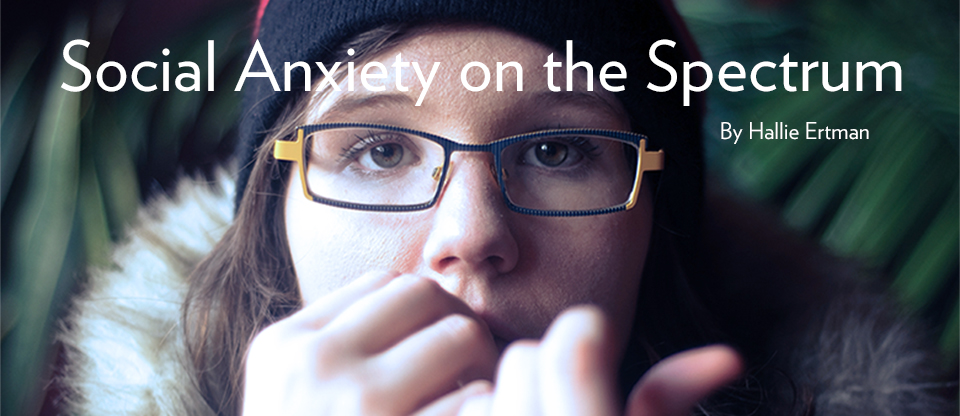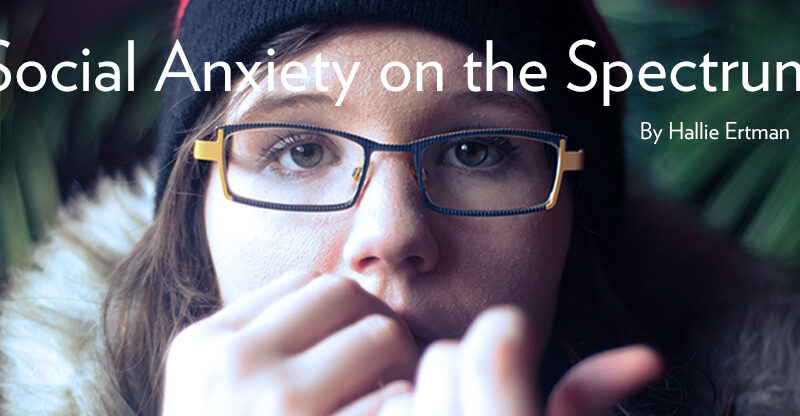Many researchers have suggested a link between Autism Spectrum Disorder (ASD) and various anxiety disorders. Years of investigation into the potential connection have established a large body of research that shows high rates of anxiety in the ASD population and especially high rates of social anxiety disorder (SAD). This is an important piece of knowledge all by itself, but we still don’t know exactly what it means. It could be explained in several different ways: aspects of ASD like sensory processing issues might contribute directly to the development of social anxiety, or the social difficulties experienced by children on the spectrum could cause them to develop social anxiety over time. We also need to keep in mind that there’s a significant overlap between the behaviors that characterize social anxiety and those observed in ASD. It’s possible that this overlap makes it hard to get a clear diagnostic picture of some individuals.
So, how many people on the spectrum actually have SAD as well? It may sound like a basic question, but it’s surprisingly hard to answer. Some researchers have suggested that SAD is over-diagnosed among individuals with ASD and that it sometimes delays the correct diagnosis of autism. Others believe that comorbidity of these disorders (having them both at the same time) is actually very high and that it is both accurate and appropriate to diagnose these individuals with ASD and SAD.
For adults, the issue is clouded even more by the fact that almost all of this research has focused on children and adolescents. Fortunately, a new study by Susanne Bejerot and colleagues was published this month in Psychiatry Research. The study examined both the occurrence and severity of social anxiety and avoidance among adults with ASD. It included 50 adults on the spectrum who had no intellectual disability, 53 neurotypical (non-autistic) adults in a matched control group, and 100 people diagnosed with SAD. This isn’t a huge sample size, but it’s more than large enough to make statistically significant comparisons. (And unfortunately, it’s larger than many other studies which focus on adults). We shouldn’t gloss over one other potential flaw in the study’s design: individuals were assessed for ASD and SAD at different time points. The researchers rightly point out that both of these are chronic and that the assessments should not be affected; nevertheless, in the future, researchers who attempt to replicate these findings should try conducting the assessments at the same point in time.
The researchers found that 28% of the individuals with ASD also met the diagnostic criteria for SAD, and that the severity of their social anxiety was similar. (Although it wasn’t quite the same: anxiety and avoidance were highest in the group diagnosed with SAD, and higher in the ASD group than in the control group). Many individuals on the spectrum and their families will be unsurprised to hear that part.
The more interesting finding may be this: that 28% also had higher AQ (Autism Quotient) scores than the other ASD adults in the study. (The AQ score, or Autism Quotient, is a self-assessment that aims to detect autistic traits). In fact, AQ scores were strongly correlated with both anxiety and avoidance scores on the SAD diagnostic assessment among both those with ASD and those with SAD. So what does that mean exactly? It means that the more autistic traits a person reported, the more they also tended to demonstrate social anxiety and avoidance. It also means that this was true even for the adults who did not have Autism Spectrum Disorder.
Overall, this study’s findings on the rates of social anxiety in adults with ASD are only slightly higher than most past studies, and basically in line with the other research on this topic. But knowing how many adults on the spectrum have SAD (or meet the diagnostic criteria) is only the first question. We have to know what that number really means: do individuals with ASD experience social anxiety differently than individuals with SAD? This is one of the most interesting questions Bejerot and her colleague raise, although we don’t yet have an answer.
Past research has found that low levels of empathy correlated with low levels of social anxiety, and that social anxiety can increase along with empathy. This has prompted some researchers to speculate that being unaware of how others see you (or just not caring) could protect against the development of social anxiety. 1 Unfortunately, none of that research has focused on adults, but it did prompt Bejerot and her colleagues to wonder if insight could also be a protective factor against SAD. The study we’re talking about today did not examine insight directly, but it did make use of the AQ, which is a self-assessment. The researchers suggested that self-reported autistic traits could be interpreted as insight in this population, which would offer an entirely new way to interpret these findings.
We can sum up these findings by saying that social anxiety and avoidance are both associated with an increase in self-reported autistic traits. So, does this mean that social anxiety increases with the presence of those traits, or that social anxiety increases with awareness of those traits, or that it increases with awareness of oneself in general? If there is more than one answer, to what extent is each true? It will be a while before we have answers to these questions, if we ever do. In the meantime, this is an intriguing line of inquiry, which could one day help many adults on the spectrum achieve a better quality of life by bringing them a more effective treatment for anxiety.
In a 2004 paper called Social Skills Deficits and Anxiety in High-Functioning Adolescents with Autism Spectrum Disorders, Scott Bellini wrote that empathy correlated with social anxiety in a very interesting way. Extremely low empathy was correlated with extremely low social anxiety, but anxiety increased as empathy increased towards the mean. This is what prompted him to speculate that these individuals don’t care how they are perceived or evaluated socially. However, as empathy increased beyond the mean, anxiety scores started to decline; this suggests that very high empathy might lead to more effective emotional coping skills and an increased ability to modify behavior based on social feedback.



 House Passes the ABLE Act: Take Three Minutes to Get It Through the Senate!
House Passes the ABLE Act: Take Three Minutes to Get It Through the Senate!


